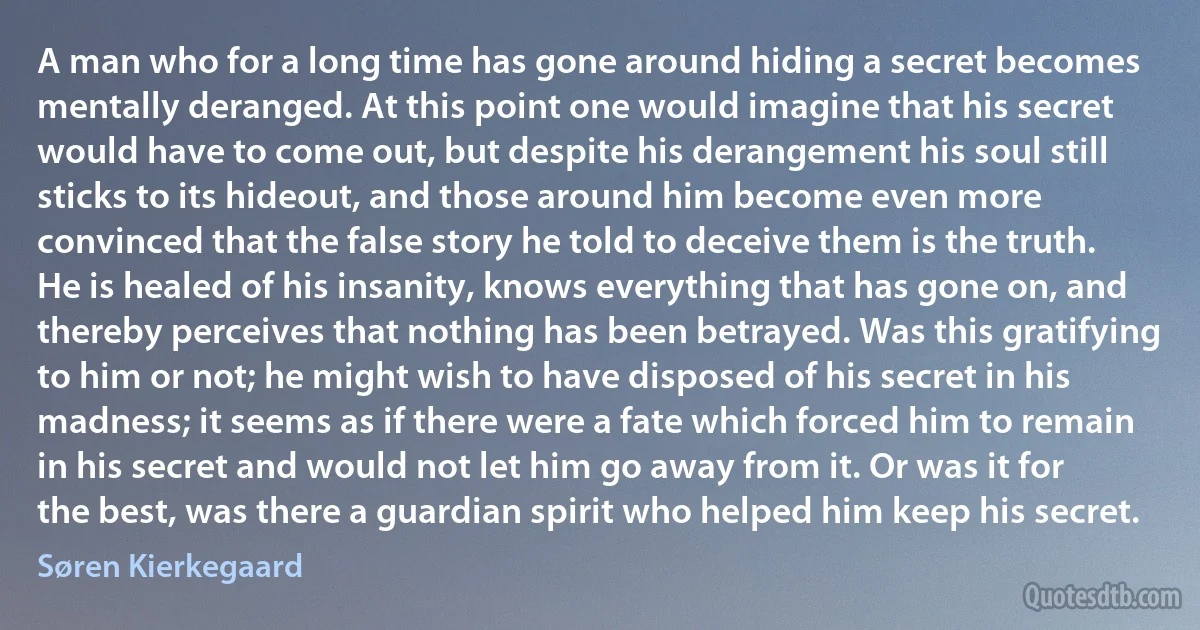
A man who for a long time has gone around hiding a secret becomes mentally deranged. At this point one would imagine that his secret would have to come out, but despite his derangement his soul still sticks to its hideout, and those around him become even more convinced that the false story he told to deceive them is the truth. He is healed of his insanity, knows everything that has gone on, and thereby perceives that nothing has been betrayed. Was this gratifying to him or not; he might wish to have disposed of his secret in his madness; it seems as if there were a fate which forced him to remain in his secret and would not let him go away from it. Or was it for the best, was there a guardian spirit who helped him keep his secret.
Søren KierkegaardRelated topics
best everything false fate hiding madness man might nothing point remain secret soul spirit story tell time truth wish sticksRelated quotes
Injustice having always hold sway (- be predominant, - régné", Fr.) on earth, there are some who ("d'aucuns", Fr.) imagine (or pretend) that the existing social order may ("pourra", Fr.) subsist (or remain) for ever. Whether this order could last until now, this was mainly due to the conviction of people, that it was of divine institution. But this belief is vanishing (or disapearing, or fainting), and with it the only moral support of the actual order will collapse, leaving (or letting) only brutal forces opposed to each others clashing, with no peaceful way out (or solution) ("et avec elle s'effondrera le seul soutient moral de l'ordre présent, ne laissant aux prises que des forces brutales opposés les unes aux autres, sans issue pacifique.", Fr.)

African Spir
...whereas the vices of Messalina were in themselves venial, being mostly a passion for sensual gratification which subordinated all things to its encompassing, Agrippina lived solely for power, frightening enough in a man but terrifying in a woman....she would sleep with anyone, though not for physical pleasure, only for political advantage. She was cursed or blessed with a certain sexual coldness, knowing as much as a temple prostitute about the arousing of male passion and the procurement of its ecstatic release but keeping herself aloof, despite an occasional simulation of desire and the odd false orgiastic shudder and scream of fulfilment, from a process she found distressingly bestial when it was not frankly comic.

Anthony Burgess
What Elizabethan playwrights learned from the Greek classics was not theories of insanity, but dramatic practice - that is, madness is a dandy theatrical element. It focuses the audience's attention and increases suspense, since you never know what a mad person may get up to next; and Shakespeare himself makes use of it in many forms. In King Lear, there's a scene in which one man pretending to be mad, another who has really gone mad, and a third who has probably always been a little addled, are brought together for purposes of comparison, irony, pathos, and tour de force acting. In Hamlet, there are two variations - Hamlet himself, who assumes madness, and Ophelia, who really does go winsomely bonkers. In MacBeth, it's Lady MacBeth who snaps.

Margaret Atwood
Philip Kaufman's Twisted walks like a thriller and talks like a thriller, but it squawks like a turkey.
But back to deus ex machina. This is a phrase you will want to study and master, not merely to amaze friends during long bus journeys but because it so perfectly describes what otherwise might take you thousands of words. Imagine a play on a stage. The hero is in a fix. The dragon is breathing fire, his sword is broken, his leg is broken, his spirit is broken, and the playwright's imagination is broken. Suddenly there is the offstage noise of the grinding of gears, and invisible machinery lowers a god onto the stage, who slays the dragon, heals the hero, and fires the playwright. He is the "god from the machine."

Roger Ebert
Consent in virtue knit your hearts so fast,
That still the knot, in spite of death, does last;
For as your tears, and sorrow-wounded soul,
Prove well that on your part this bond is whole,
So all we know of what they do above,
Is that they happy are, and that they love.
Let dark oblivion, and the hollow grave,
Content themselves our frailer thoughts to have;
Well-chosen love is never taught to die,
But with our nobler part invades the sky.
Then grieve no more that one so heavenly shaped
The crooked hand of trembling age escaped;
Rather, since we beheld her not decay,
But that she vanish'd so entire away,
Her wondrous beauty, and her goodness, merit
We should suppose that some propitious spirit
In that celestial form frequented here,
And is not dead, but ceases to appear.

Edmund Waller
